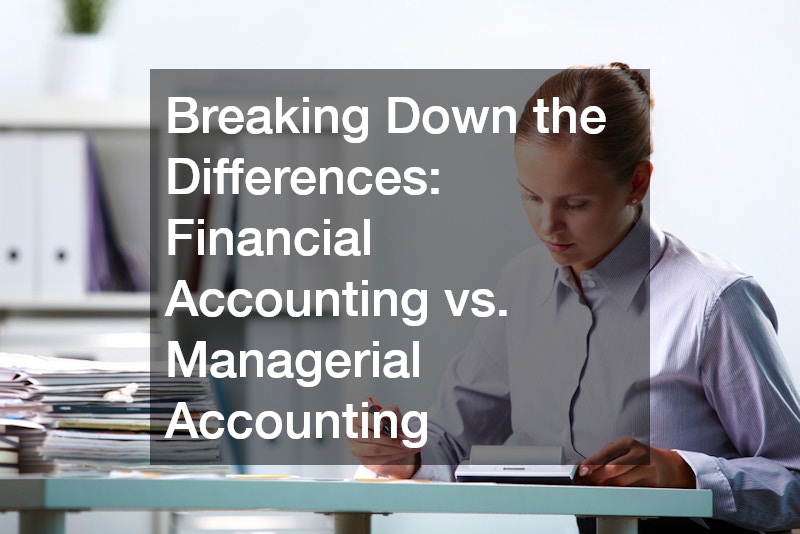
Accounting is often referred to as the “language of business,” and within this language, there are several dialects. Two of the most prominent branches are financial accounting and managerial accounting. While they may seem similar on the surface, these two practices serve distinct purposes and audiences, offering unique benefits to businesses. Understanding the differences between financial and managerial accounting is essential, especially for those deciding which career path to pursue or business owners determining what type of reporting they need. In this article, we will explore the key differences between financial and managerial accounting, shedding light on which approach is best suited for various business needs.
What Is Financial Accounting?
Financial accounting is primarily concerned with recording, summarizing, and reporting a company’s financial transactions over a specific period. The goal is to provide external stakeholders, such as investors, creditors, and regulators, with an accurate picture of the company’s financial health. This information is typically presented in the form of standardized financial statements, including the income statement, balance sheet, and statement of cash flows.
A key feature of financial accounting is its adherence to strict guidelines and regulations. Financial accountants must follow frameworks such as Generally Accepted Accounting Principles (GAAP) or International Financial Reporting Standards (IFRS). These standards ensure that financial reports are accurate, consistent, and comparable across companies. For example, a financial accountant in London must follow these principles when preparing financial statements for companies operating in the UK.
What Is Managerial Accounting?
On the other hand, managerial accounting focuses on providing internal reports to help management make informed business decisions. Instead of targeting external stakeholders, managerial accountants work closely with executives and department heads to create reports that assist in planning, forecasting, budgeting, and risk management. These reports are typically forward-looking, helping management to anticipate future trends and allocate resources efficiently.
Unlike financial accounting, managerial accounting is not bound by external regulations. The reports can be tailored to the specific needs of the business and may include both financial and non-financial information. For instance, a report might cover employee performance metrics, production costs, or even market trends, all designed to support internal decision-making.
Now that we’ve defined each of these accounting practices, let’s delve into five major differences between financial accounting and managerial accounting.
1. Target Audience: External vs. Internal
One of the most significant differences between financial and managerial accounting lies in their respective audiences. Financial accounting caters to external stakeholders, such as investors, lenders, and regulatory bodies. These groups use financial statements to assess a company’s profitability, solvency, and overall financial health.
In contrast, managerial accounting is used by internal stakeholders. Its primary audience includes company managers, department heads, and executives who need detailed information to make day-to-day operational decisions. The reports generated by managerial accountants are not intended for public disclosure and often remain confidential.
2. Focus: Historical vs. Future-Oriented
Financial accounting is retrospective. Financial reports focus on summarizing past performance over a given period, whether it be quarterly, annually, or over another specified time frame. Historical data such as past sales, expenses, and profits are gathered and compiled to create these reports.
Managerial accounting, however, is forward-looking. It focuses on the future, helping management with forecasting, budgeting, and strategic planning. This future-oriented approach allows businesses to anticipate challenges and opportunities, helping them to make informed decisions that will drive long-term growth and success.
3. Scope: Whole Company vs. Segments
Financial accounting tends to take a broad approach, consolidating data from all areas of the business to present a holistic picture. The financial statements generated are comprehensive and offer an overall view of the company’s financial performance. This allows external stakeholders to understand the big picture of how the business is doing.
Managerial accounting, on the other hand, often breaks the business down into smaller segments. This could be based on divisions, departments, or even specific projects. Managers can request detailed reports for each segment, allowing them to evaluate performance and make targeted decisions. For instance, a company might want to analyze the profitability of a specific product line or regional operation.
4. Regulation: Highly Regulated vs. Flexible
One of the defining characteristics of financial accounting is its strict regulatory environment. Financial accountants must adhere to established frameworks like GAAP or IFRS, ensuring that reports are standardized and consistent across businesses. These regulations are in place to protect external users of the financial statements from fraud and misinformation.
In contrast, managerial accounting is far more flexible. Since the reports are for internal use, there are no strict rules or formats that need to be followed. Managerial accountants have the freedom to present information in a way that best serves the company’s needs, whether through spreadsheets, graphs, or narrative reports. The priority is on relevance and timeliness, rather than strict adherence to standards.
5. Necessity: Required vs. Optional
For most businesses, financial accounting is an absolute necessity. Once a company reaches a certain size or is publicly traded, it must produce financial statements for external parties. These reports are essential for securing loans, attracting investors, and complying with regulatory requirements.
Managerial accounting, on the other hand, is technically optional. While most large businesses recognize the value of managerial accounting in improving decision-making and driving efficiency, smaller companies may not see the need for it or may lack the resources to employ a dedicated managerial accountant.
Conclusion: Which Is Right for You?
In summary, financial and managerial accounting serve different but equally important purposes. Financial accounting provides external stakeholders with a clear picture of a company’s financial performance, while managerial accounting helps internal stakeholders make informed business decisions for the future. For companies seeking external investment or regulatory compliance, financial accounting is non-negotiable. However, businesses that prioritize internal decision-making, planning, and efficiency will benefit greatly from the insights provided by managerial accounting.
Whether you are a business owner, an aspiring accountant, or perhaps looking for a financial accountant London, understanding these two distinct branches of accounting is crucial for making informed decisions that impact business success.
.





